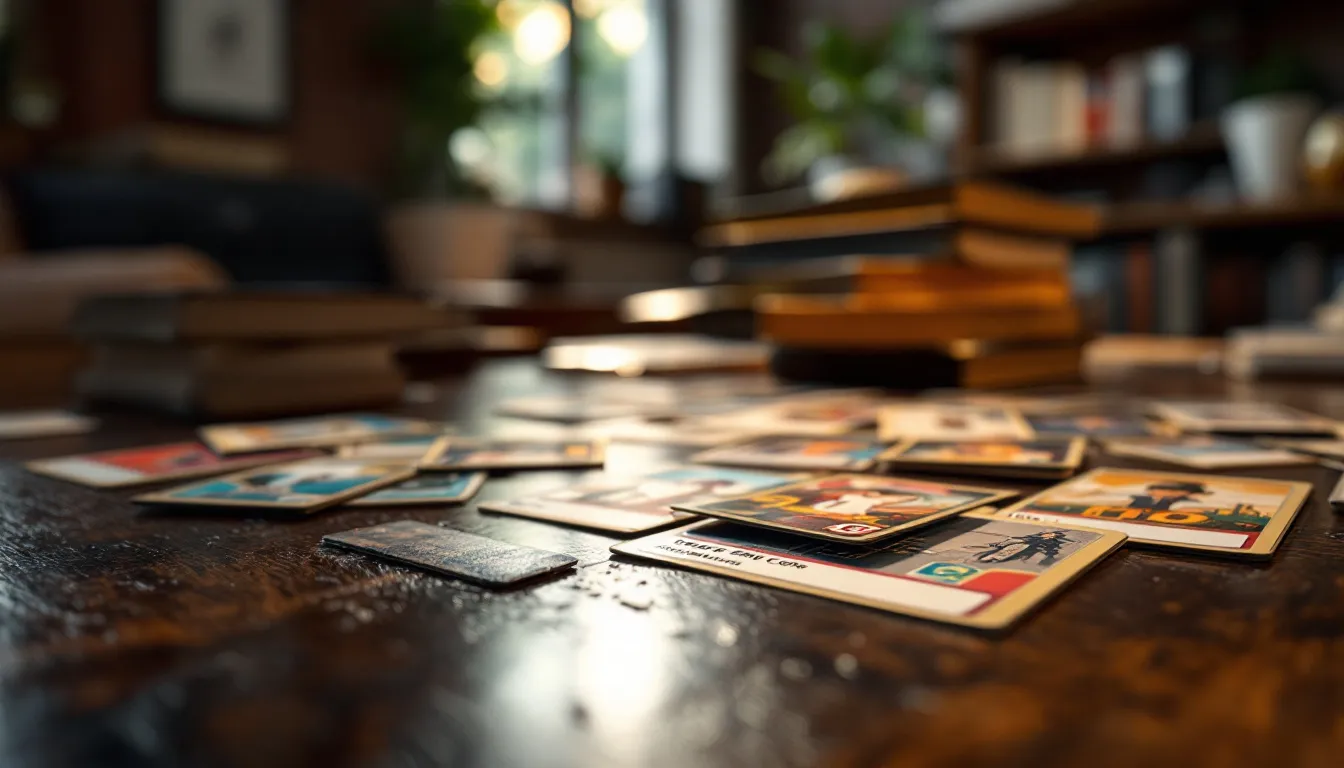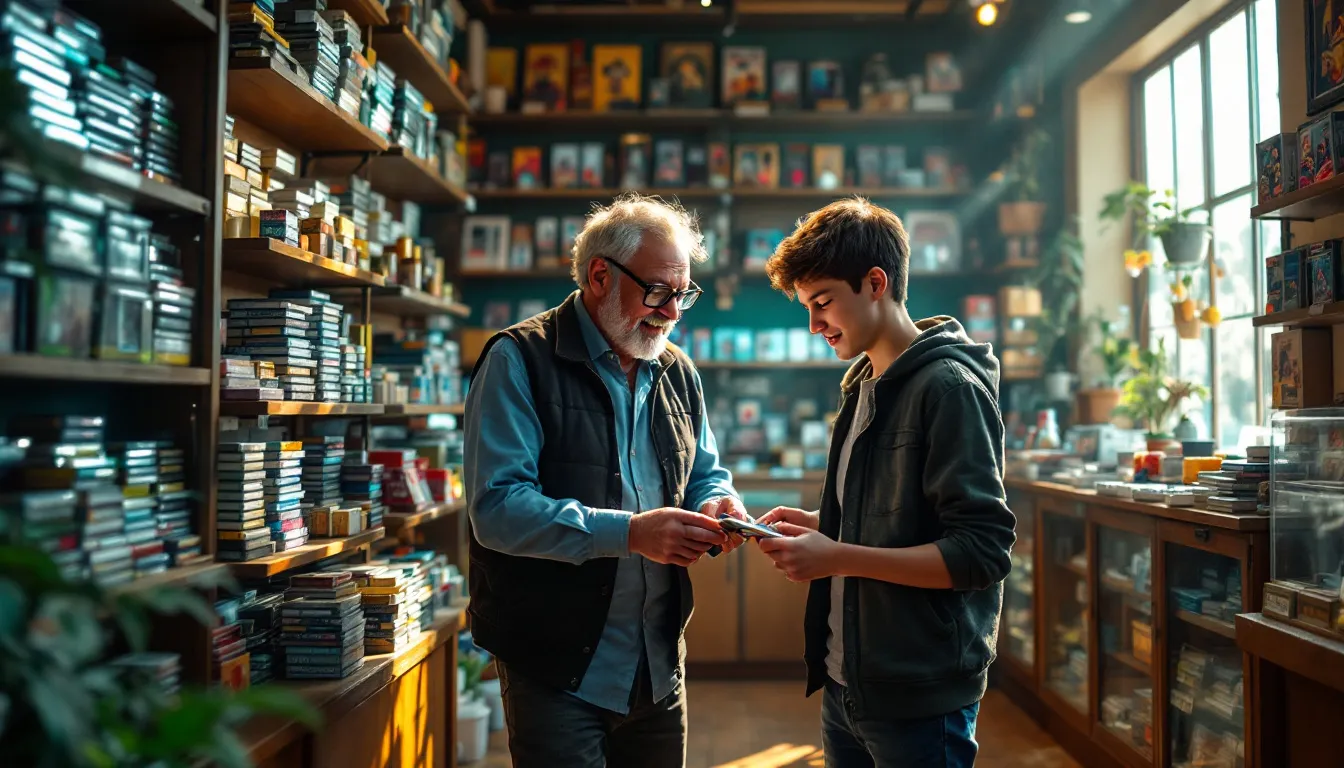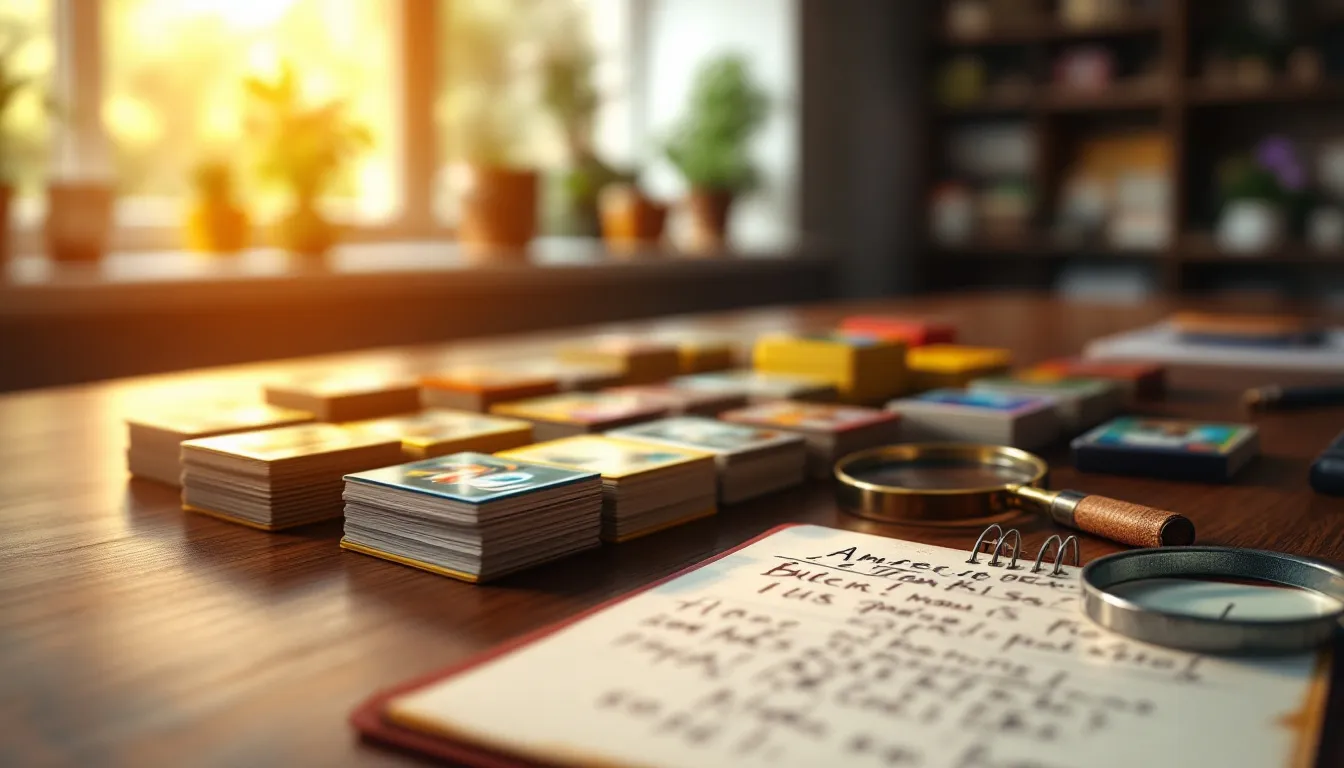Trading cards isn't just about swapping cardboard - it's about building relationships and fostering a positive community. Here's what you need to know about card trading etiquette:
- Be honest about card condition and value
- Handle cards carefully using sleeves and holders
- Communicate clearly and don't pressure others
- Meet in safe public places for in-person trades
- Support local card shops
- Be polite even if a trade falls through
- Keep records of your trades
- Learn to spot fake cards
Following these guidelines helps create fair, fun experiences for everyone. Whether you're new to the hobby or a seasoned collector, good etiquette is key to successful trades and lasting connections in the card community.
Key trading terms to know:
- Rookie card: A player's first official card
- Chase card: Rare, highly sought-after cards
- Insert: Special cards that appear less frequently
- Parallel: Limited edition versions of base cards
- Grading: Professional assessment of card condition
Where to trade:
- Local card shops
- Online marketplaces (eBay, COMC)
- Trading events and conventions
- Online communities and forums
Remember: In card trading, how you act is just as important as what you trade. Good etiquette keeps the hobby thriving for all.
Related video from YouTube
Trading Basics
Let's dive into the world of card trading. It's fun, but you need to know the basics to do it right.
Common Trading Terms
Want to talk shop with other traders? Learn these key terms:
- Rookie Card: A player's first official card. Collectors love these.
- Chase Card: The rare gems everyone wants. They're the stars of a card set.
- Insert: Special cards that show up less often in packs. They usually look cooler than regular cards.
- Parallel: Limited edition versions of normal cards. Think different colors or finishes.
- Grading: When pros check out how good a card's condition is. They give it a score from 1 to 10.
Knowing these terms helps you chat with other traders like a pro. As Giant Sports Cards puts it: "Learning card lingo is part of the fun. It helps you get what other collectors are talking about."
Where to Trade Cards
Want to know where the action is? Check out these trading hotspots:
1. Local Card Shops
These are great for meeting other collectors and finding rare cards. For example, Pastime Sports & Games in Langley City, British Columbia, is a top-notch spot for collectibles in Canada.
2. Online Marketplaces
Sites like eBay, COMC, and StockX have tons of cards and connect you with traders all over the world.
3. Trading Events
Card shows and conventions let you trade in person and see a bunch of different cards.
4. Online Communities
Forums and social media groups for card trading are perfect for connecting with other fans.
Looking for local shops? Check out Card Shops List (https://cardshopslist.com). They've got a big list of stores that sell sports cards, trading card games, and collectibles.
Meeting Other Traders
Making friends with other traders is key to having a good time and making smart trades. Here's how to do it:
Be polite when you talk to other traders. Start with small trades to build trust before you go for the big stuff. Share what you know about your collection - it can lead to cool connections and info.
Go to trading nights at local shops or card shows to meet people face-to-face. Join online groups and chat about cards on forums or social media.
Trading Rules to Follow
Trading cards isn't just swapping cardboard. It's an art. You need respect, care, and clear communication. Let's look at the key rules that'll make you a great trading partner.
How to Handle Cards
Cards aren't just paper. They're valuable collectibles. Here's how to handle them right:
- Hold cards by the edges. No fingerprints or scratches.
- Use protective sleeves. Standard ones work. Want extra protection? Try premium sleeves or top loaders.
- Check before trading. Look for creases, bends, or damage.
"I always had to inspect our trades and make sure there were no creases or fingerprints (pet peeve) on any of them." - Marie, co-writer of A Cardboard Problem
Keep your cards in a cool, dry place. No direct sunlight. This keeps them in good shape and valuable.
How to Talk About Trades
Good trades need clear, honest talk. Here's how:
- Be honest about card condition. Describe flaws accurately. Honesty builds trust.
- Talk openly about card value. Remember, it's not just about rarity. How the card plays in the game matters too.
- If someone says no to a trade, accept it. Don't push. It's not cool in the trading world.
For example, the Black Lotus card from Magic: The Gathering is super valuable. Why? It's rare (only 1,100 in the Alpha set) AND it's powerful in the game.
Recording Your Trades
Keeping track of trades isn't just good organization. It's smart. Here's why:
- It stops arguments. You have a clear record of what was traded.
- It helps spot fakes. You can check the details if you're not sure about a card later.
- It shows how your collection grows. It's fun (and useful) to see how your cards change over time.
Try using a simple spreadsheet or a card collecting app. Write down the date, cards traded, condition notes, and who you traded with.
Making Fair Trades
Fair trades keep the card trading community healthy. They build trust and make the hobby fun for everyone. Here's how to make sure your trades are honest and equal.
Checking Card Prices
Getting prices right is key for fair trades. Here's how:
1. Use good resources
Card Shops List (https://cardshopslist.com) is great for finding card values. It lists shops that specialize in sports cards, trading card games, and collectibles.
2. Look at card condition
A card's condition can change its value a lot. Check this out:
An O-Pee-Chee Wayne Gretzky rookie card graded 10 by PSA sold for $3.75 million. The same card graded 9? Only $115,000. That's a huge difference!
3. Get cards graded
For expensive cards, professional grading is worth it. Alex Goddard from Sotheby's says:
"Grading can take a while and cost a bit. But the price difference between a 10, 9 and 8 can be huge."
4. Use online tools
Sites like MAVIN.io help you find card values and track your collection. Save your searches and list your cards to stay organized.
No-Pressure Trading
Keeping things relaxed makes trades fairer. Try these:
- Give your trading partner time to think. Quick decisions often lead to regrets.
- Be ready to negotiate. If they don't like your first offer, talk about other options.
- If someone says no, that's okay. Don't push too hard - it can hurt relationships.
Balanced Trading
Both traders should get a fair deal. Here's how:
1. Compare total values
Use those pricing tools we talked about to check the total value on both sides of the trade.
2. Think about rarity and demand
Some cards might cost the same but be harder to find or more popular. Keep that in mind.
3. Be honest
Tell your trading partner about any flaws or special things about your cards. Being upfront builds trust and leads to better trades.
4. Stay safe
For high-value trades, think about using an escrow service or meeting at a local card shop. They can act as a neutral third party.
sbb-itb-0db97a5
Staying Safe While Trading
Trading cards is fun, but safety comes first. Here's how to protect yourself and your cards during trades.
Spotting Fake Cards
Fake cards are a big problem. They can cost you money and mess up your collection. Here's how to spot them:
- Look at the print quality. Real cards have sharp images and clear text. Blurry or pixelated? Probably fake.
- Feel the card. Genuine cards use good materials. Pay attention to weight and texture.
- Check for security features. Many new cards have holograms or watermarks that are tough to copy.
Always compare the card to a real one. If you can, use a blacklight to check for hidden security stuff. And remember: if it seems too good to be true, it probably is.
"Trust your gut. If a card feels 'off,' listen to that feeling." - TCGplayer Expert
Where to Meet for Trades
Picking a safe spot for in-person trades is key. Here are some options:
1. SafeTrade Stations
These are special safe spots for online deals. They're often near police stations and well-lit.
2. Designated Online Transaction Space (D.O.T.S.)
In San Diego, D.O.T.S. gives you a public place to meet for online or private sales. It's marked with city signs and the police can see it.
3. Safe Exchange Zones
Many police departments have these. For example, Charleston Police Department has two:
- Downtown: 180 Lockwood Boulevard, Charleston, SC 29403
- West Ashley: 3545 Mary Ader Avenue, Charleston, SC 29403
These zones have cameras watching 24/7 and signs to mark them.
When you meet for a trade:
- Go during the day
- Bring your phone
- Trust your gut
- Watch out for scams
Fixing Trade Problems
Sometimes trades go wrong. Here's what to do:
1. Talk it out
Try to fix things with the other person first.
2. Keep records
Save all your messages and info about the trade.
3. Use safe payment methods
Don't use wire transfers or personal checks. Use secure payment on trusted websites instead.
4. Know the rules
Learn about local laws and website policies for trades.
Keep your personal info safe. Digital fraud attempts in the US are up 122%, so be careful sharing details online.
Being a Good Trading Partner
Want to be a star in the trading community? It's all about building solid relationships. Let's dive into how you can be an awesome trading partner and help create a thriving card trading scene.
Being Polite During Trades
Politeness is key, even when trades don't go your way. Here's how to keep things friendly:
- Say hi and introduce yourself
- Handle cards carefully, even ones you don't want
- Give your partner time to think - no pressure!
- If they say no, that's okay. Don't argue
- Spot an issue? Mention it nicely
- Always say thanks, no matter what
The People's Card Shop nails it: "Trading cards is a big part of TCGs. Ensure fair and respectful trades by being honest about card conditions and respecting declines."
Help Local Card Shops
Your local card shops are the heartbeat of the trading community. Here's why they matter and how you can help:
1. Keep the local scene alive
Local shops are where collectors meet, trade, and geek out together. Supporting them keeps these community hubs going strong.
2. Tap into expert knowledge
Shop owners often know their stuff. Their advice can help you make smarter trades.
3. Make trading buddies
Hanging out at local shops is a great way to meet other collectors and find long-term trading partners.
4. Support your local economy
Your purchases help small businesses thrive, which is good for your whole community.
Need to find a shop near you? Check out Card Shops List (https://cardshopslist.com). It's a great tool for finding stores that specialize in sports cards, trading card games, and collectibles in your area.
When you visit local shops, remember:
- Buy something now and then to show support
- Don't hog tables or displays
- Always ask about trading rules before making deals in the store
One anonymous local card shop trader shares: "My LCS does not allow on-site trading or selling and I think that's appropriate, because it does directly interfere with their own business." This shows why it's crucial to know and respect each shop's rules.
Wrap-Up
Trading cards isn't just swapping cardboard - it's building a community. Good etiquette is the backbone of successful and fun card trading.
Communication is key. Use the chat box to introduce yourself and list the cards you want. Helios52 says:
"Once you propose something to a user, give them a few days (at least 3-4) to get back to you."
This patience shows respect for your trading partner's time.
New traders: develop a solid game plan. Focus on specific players and sets you like, not trends. Do your research. This helps you make smart choices and avoid overpaying for cards that might not keep their value.
Be picky about card condition. Use grading equipment to check card quality before submission. Be upfront about any flaws when trading. This builds trust and leads to fairer trades.
Don't ignore local card shops. They're great for expert knowledge and meeting other collectors. Use Card Shops List (https://cardshopslist.com) to find specialty stores near you.
Keep it fun. One collector puts it well:
"Be happy. Don't beat yourself up about the cards that got away. Collecting cards shouldn't be a stressful hobby."
That's what card trading is all about - a fun hobby that brings people together.
FAQs
What are the tips for trading Pokémon cards?
Trading Pokémon cards can be a blast. But how do you make sure you're not getting the short end of the stick? Here are some tips to help you trade like a pro:
Know what you want. Are you trying to complete a set? Hunting for that one rare card? Or just building up your collection? Having a clear goal will keep you focused and help you avoid impulse trades.
Take your time. Don't jump at the first offer you get. Think about the long-term value of the cards. And don't be afraid to negotiate. As Parker, who wrote the Beginner's Guide to the Pokemon Trading Card Game, puts it: "Set clear goals: Establish your trading objectives, whether it's completing a specific set, acquiring rare cards, or simply expanding your collection."
Do your homework. Check out reliable sources to see what cards are worth. This way, you'll know if you're getting a fair deal.
Look closely at the cards. Check for wear and tear, damage, or anything that looks off. And be honest about the condition of your own cards too.
Make friends in the trading world. Whether it's at your local game store or in online forums, building relationships can lead to better trades and more fun overall.


